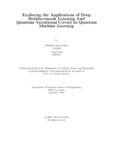Exploring the applications of deep reinforcement learning and quantum variational circuit In quantum machine learning
Abstract
In recent years, quantum computing has outperformed classical computing in many
aspects, including the advancement of approaches in Reinforcement Learning prob-
lems. Particularly, it has the power to utilize the quantum phenomena of super-
position and entanglement, that can fastened the calculation of a vast amount of
data which is very challenging for classical computers. Unfortunately, the current
Quantum Computing platforms are very complex to initiate classical reinforcement
learning problems for uncontrollability and intricacy of quantum circuits. In our
work, we explore the application of Quantum Variational Circuit (QVC) in Deep Q-
Network (DQN) instead of classical Reinforcement Learning approaches to enhance
the performance of Reinforcement Learning. To achieve that, we use Quantum Vari-
ational Circuit (QVC) based reinforcement learning approaches to solve the classical
problems and we also solve the classical problems using classical DQN and Double
Deep Q-Network (DDQN) Reinforcement Learning to compare between classical
and quantum approaches. We solve Atari and Lunar Lander in OpenAI Gym envi-
ronments using QVC based DQN Reinforcement learning. We study encoding tech-
niques such as amplitude encoding, scaled encoding and directional encoding which
were previously used in this paper[1]. We exercise IBM's open-source SDK (QISKit)
and IBM-Q for quantum circuit implementation which can produce improved appli-
cations like Quantum error Correction codes etc. We also use TensorFlow Quantum
to implement the hybrid classical-quantum computation and experimentally analyze
our work.
Keywords
Quantum computing; Reinforcement learning; Quantum Machine Learning (QML); Quantum Variational Circuit (QVC); Deep Q-Network (DQN); Double Deep Q-Network (DDQN); OpenAI Gym; IBM-Q; TensorFlow QuantumDescription
This thesis is submitted in partial fulfillment of the requirements for the degree of Bachelor of Science in Computer Science and Engineering, 2021.Department
Department of Computer Science and Engineering, Brac UniversityType
ThesisCollections
Related items
Showing items related by title, author, creator and subject.
-
An experimental demonstration of quantum NOT gate: transition from classical to quantum regime
Sajeed, Shihan; Haider, A F M Yusuf (© 2010 IEEE, 2010)Path of a photon was considered to be used as qubit for implementing quantum NOT gate. An experimental setup was designed using a Mach-Zehnder interferometer constructed from simple optical devices such as He-Ne lasers, ... -
Analysis of quantum capacitance and quantum hall effect of silicene for different fermi energy
Hasan, Rifat; Hassan, Asif S.; Abedin, Minhaz Ibna; Mondol, Raktim Kumar (© 2015 Institute of Electrical and Electronics Engineers Inc., 2015)Silicene is a monolayer of silicon which is again an isostructure to graphene. Due to zero bandgap of graphene, it is now subsided by silicene which opens new opportunities for electrically tunable electronic devices. But ... -
Quantum computer simulator based on qutrits and the circuit model of quantum computation
Kaonain, Md. Shamsul (BRAC University, 2009-12)The number of quantum bits that can currently be realized is limited; therefore extending the state space to explore multi-valued options is reasonable. A quantum computer simulator based on qutrits (3 valued quantum ...


